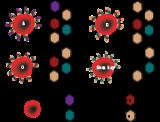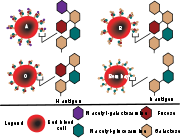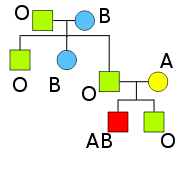
Hh antigen system
Encyclopedia

Red blood cell
Red blood cells are the most common type of blood cell and the vertebrate organism's principal means of delivering oxygen to the body tissues via the blood flow through the circulatory system...
s, whatever allele
Allele
An allele is one of two or more forms of a gene or a genetic locus . "Allel" is an abbreviation of allelomorph. Sometimes, different alleles can result in different observable phenotypic traits, such as different pigmentation...
s they may have of the A and B blood-group genes, because A antigen and B antigen are made from H antigen; receiving blood which contains an antigen which has never been in the patient's own blood causes an immune reaction. As a result, people who have Bombay phenotype can donate to any member of the ABO blood group system
ABO blood group system
The ABO blood group system is the most important blood type system in human blood transfusion. The associated anti-A antibodies and anti-B antibodies are usually IgM antibodies, which are usually produced in the first years of life by sensitization to environmental substances such as food,...
(unless some other blood factor gene
Gene
A gene is a molecular unit of heredity of a living organism. It is a name given to some stretches of DNA and RNA that code for a type of protein or for an RNA chain that has a function in the organism. Living beings depend on genes, as they specify all proteins and functional RNA chains...
, such as Rhesus
Rhesus blood group system
The Rh blood group system is one of thirty current human blood group systems. Clinically, it is the most important blood group system after ABO. At Present, the Rh blood group system consists of 50 defined blood-group antigens, among which the 5 antigens D, C, c, E, and e are the most important...
, is incompatible), but they cannot receive any member of the ABO blood group system
ABO blood group system
The ABO blood group system is the most important blood type system in human blood transfusion. The associated anti-A antibodies and anti-B antibodies are usually IgM antibodies, which are usually produced in the first years of life by sensitization to environmental substances such as food,...
's blood (which always contains one or more of A and B and H antigens), but only from other people who have Bombay phenotype. The usual tests for ABO blood group system would show them as group O, unless the hospital worker involved has the means and the thought to test for Bombay group.
This blood phenotype was first discovered in Bombay, now known as Mumbai
Mumbai
Mumbai , formerly known as Bombay in English, is the capital of the Indian state of Maharashtra. It is the most populous city in India, and the fourth most populous city in the world, with a total metropolitan area population of approximately 20.5 million...
, in India
India
India , officially the Republic of India , is a country in South Asia. It is the seventh-largest country by geographical area, the second-most populous country with over 1.2 billion people, and the most populous democracy in the world...
, by Dr. Y.M. Bhende, as published in 1952. It is present in about 0.0004% (about 4 per million) of the human population generally, though in some places such as Mumbai (formerly Bombay) local populations can have occurrences in as much as 0.01% (1 in 10,000) of inhabitants.
Individuals with Bombay phenotype blood group can only be transfused with blood
Blood
Blood is a specialized bodily fluid in animals that delivers necessary substances such as nutrients and oxygen to the cells and transports metabolic waste products away from those same cells....
from other Bombay phenotype individuals. Given that this condition is very rare, any person with this blood group who needs an urgent blood transfusion
Blood transfusion
Blood transfusion is the process of receiving blood products into one's circulation intravenously. Transfusions are used in a variety of medical conditions to replace lost components of the blood...
will probably be unable to get it, as no blood bank would have any in stock. Those anticipating the need for blood transfusion (e.g. in scheduled surgery
Surgery
Surgery is an ancient medical specialty that uses operative manual and instrumental techniques on a patient to investigate and/or treat a pathological condition such as disease or injury, or to help improve bodily function or appearance.An act of performing surgery may be called a surgical...
) may bank blood for their own use (i.e., an autologous blood donation), but this option is not available in cases of accidental injury.
Genetics

Allele
An allele is one of two or more forms of a gene or a genetic locus . "Allel" is an abbreviation of allelomorph. Sometimes, different alleles can result in different observable phenotypic traits, such as different pigmentation...
s of the H gene, (their blood group is Oh and their genotype is hh), and so do not produce the H carbohydrate that is the precursor to the A and B antigens. It then no longer matters whether the A or B enzymes are present or not, as no A or B antigen can be produced since the precursor antigen H is not present.
Despite the designation O, Oh negative is not a sub-group of any other group. When Bombay blood group was first encountered, it was found not to contain antigens A or B and so was thought to be of group O. But experience showed that Bombay group patients could not even safely receive normal O-group blood, and this proved to be because they lacked the H antigen.
Because both parents must carry this recessive allele to transmit this blood type to their children, the condition mainly occurs in small closed-off communities where there is a good chance of both parents of a child either being of Bombay type, or being heterozygous for the h gene allele
Allele
An allele is one of two or more forms of a gene or a genetic locus . "Allel" is an abbreviation of allelomorph. Sometimes, different alleles can result in different observable phenotypic traits, such as different pigmentation...
and so carrying the Bombay characteristic as recessive
Recessive
In genetics, the term "recessive gene" refers to an allele that causes a phenotype that is only seen in a homozygous genotype and never in a heterozygous genotype. Every person has two copies of every gene on autosomal chromosomes, one from mother and one from father...
. Other examples may include noble families, which are inbred due to custom rather than local genetic variety.
Popular culture
- In the horror manga Reiko the Zombie ShopReiko the Zombie Shopis a Japanese manga series by Rei Mikamoto, chronicling the exploits of Reiko Himezono, a teenage “zombie shop”, or a "...necromancer-for-hire employed by bereaved families to resurrect departed loved ones for a short time so that the dead may impart their final truths to the living.” Eleven...
, the character Midori Yurikawa, a friendly, but temperamental young girl who becomes homicidal when assaulted and her more malicious older sister Saki Yurikawa (who died in volume one and came back as a zombie) is revealed to be a carrier of the Bombay blood type and is searched for by Reiko after Dr. Akiyama (the doctor who watched over Midori) committed suicide by slitting her wrists.
- In the detective anime Get Backers, the protagonists Ban and Ginji are sent on a mission to acquire Bombay blood for a terminally ill girl named Yumiko. It is later revealed that one of the antagonists possesses the blood type and they are forced to fight them to acquire the blood.
External links
- Hh at BGMUTBGMUTThe BGMUT Database documents allelic variations in the genes encoding for human blood group systems. It was set up in 1999 through an initiative of the Human Genome Variation Society . Since 2006, it has been a part of the dbRBC resource of NCBI at the NIH...
Blood Group Antigen Gene Mutation Database at NCBINational Center for Biotechnology InformationThe National Center for Biotechnology Information is part of the United States National Library of Medicine , a branch of the National Institutes of Health. The NCBI is located in Bethesda, Maryland and was founded in 1988 through legislation sponsored by Senator Claude Pepper...
, NIH - RMIT University The Bombay, para-Bombay and other H deficiencies

